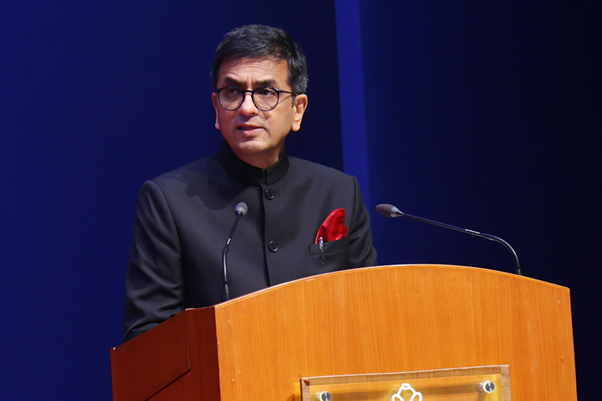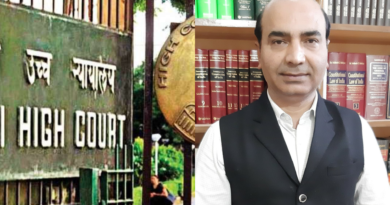Justice Delayed: Unwanted Adjournments Culture in Judiciary Must End: CJI DY Chandrachud
(Judicial Quest News Network)
Chief Justice of India DY Chandrachud on Saturday said the adjournment andculture has to go from district judiciary so that its image in the mind of litigant gets changed.
CJI said that the principle of the “bail is the rule , and jail is the exception “ has been loosing ground due to unwanted culture of adjournmnets in Indian Judiciary.
In today’s times, common citizens feel that adjournment has become a part of the judicial system. This perception is disheartening, as adjournments, which were never intended to be commonplace, have now become normalized within the judicial process.
The CJI was speaking at the Judicial Officers Conclave at Kachahh, Gujarat.
He further said that the adjournmnets have become a norm now.For this, he cited the example of a patient going to Doctor only to hear that the former is not going to treat today.
He further said that Courts nationwide are grappling with a significant backlog and an alarming level of pending cases. This backlog and pendency of cases present a formidable challenge to the efficient administration of justice and the timely resolution of legal disputes.
“Often legal decisions do not emerge during the life time of farmers.We should not wait for our citizens to die waiting for a judicial result.The concept of access to justice has to go beyond access to courts, and has to translate into decisions of the court .
The CJI proceeded to casl for an examination of why district courts seemed to be reluctant in upholding the personal liberty of citizens. Referring to the practice of district judges appearing hesitantto grant bail, the CJI said.
Chief Justicce of Gujarat High Court Justice Sunita Agarwal echoedCJI Chandrachud, saying judges play a “pivotal role in deciding the image of their own court”Each judge should make an effort amongst themselves and make rules that adjournment won’t be given in their court and see how things change from ttherre onwards,.” She noted.
Supreme Court Judge Sanjay Khanna also spoke at the event.
The CJI in his speech further dwelt on length on issues faced by the district judiciary in India.
“Today is an extraordinary day for me. This is because I am present among the judicial officers of the district judiciary from across the country. The district judiciary forms the backbone of our legal system. By organizing this Conference, we celebrate the commitment and the role of our district judiciary. At the same time, we have gathered here to listen directly from judicial officers about what affects the working of the district judiciary and how can we improve it. After all, solutions to large problems emerge through direct conversations with the stakeholders.”CJI DY Chandrachud Said.
On adjournmnets and case pendency, he stated that the common man feels that such a culture is a part of the judicial process.
When a common citizen interacts with the district judiciary, several key issues may impact their experience and access to justice.
One of the foremost challenges is the development of adequate infrastructure to support the needs of the district judiciary and the citizens it serves.
Infrastructure encompasses physical facilities such as courthouses, courtrooms, and administrative offices.
Many districts face shortages of such facilities, leading to overcrowded courtrooms, insufficient space for legal proceedings, and delays in case hearings.
CJI also expressed anguish about the alck of facilities available for women in the legal profession.
He further emphasizes the critical importance of inclusivity and diversity within our judiciary. It is heartening to note that strides have been made towards achieving greater gender representation, with women now constituting 36.3% of the working strength of the district judiciary.
Furthermore, recent recruitment trends indicate a positive shift, with more than 50% of selected candidates in the last Civil Judge (Junior Division) recruitment exam being women in 14 out of the 16 states examined.
However, while progress has been made in terms of gender representation, there remains a pressing need to ensure that our judicial institutions are truly inclusive and accommodating for all. It is concerning to note that despite the presence of female judges, amenities and facilities catering to their specific needs are sorely lacking. Shockingly, only 6.7% of toilets in District Court complexes have facilities for sanitary napkin vending machines and are female-friendly.
On the matters of the restraints adopted by the district judiciary while dealing with the matters related to personel liberty, the CJI sadi “ there is a rising apprehension that there is restraint in district courts in matters concerning personal liberty. (That) the bail is the rule is losing ground in district courts and this trend needs through evaluation and all district judges must tell me why this trend is emerging?
Quite often, judgments coming from district courts use gender-stereotypical language, which denigrates the dignity of women.
Our judges in the district judiciary must be conscious of the language they use in court proceedings and judgments.
After all, language holds immense power and influence within the realm of law and justice. The words used by judges not only reflect norms and attitudes but also shape perceptions and outcomes. When judgments employ gender-stereotypical language or perpetuate biases, they perpetuate systemic inequalities and contribute to the marginalization of women within the legal system.
He further called for a change in culture in terms of interactions betwenn the higher judiciary and the district judiciary.
Let us stop addressing district judiciary as subordinate judiciary and infuse dignigty in the work done Justice Bela Trivedi is an example who rose from the district judiciary and she is here toguide you all.At the Supreme Court, we create policiesbut it is you all who implement it, he rmarked as he concluded his address.
Justice Khanna also spoke at the event and said that
“Are judges special? No we are not. It is in the nature of work we do, it is the right conferred by the society to remedy the wrong , punish the guilty , check the injustice meted out to commoners and the poor . We must not forget the power we have is bestowed by the people and this is why we have to meet the expectations of the public and must work truthfully.




